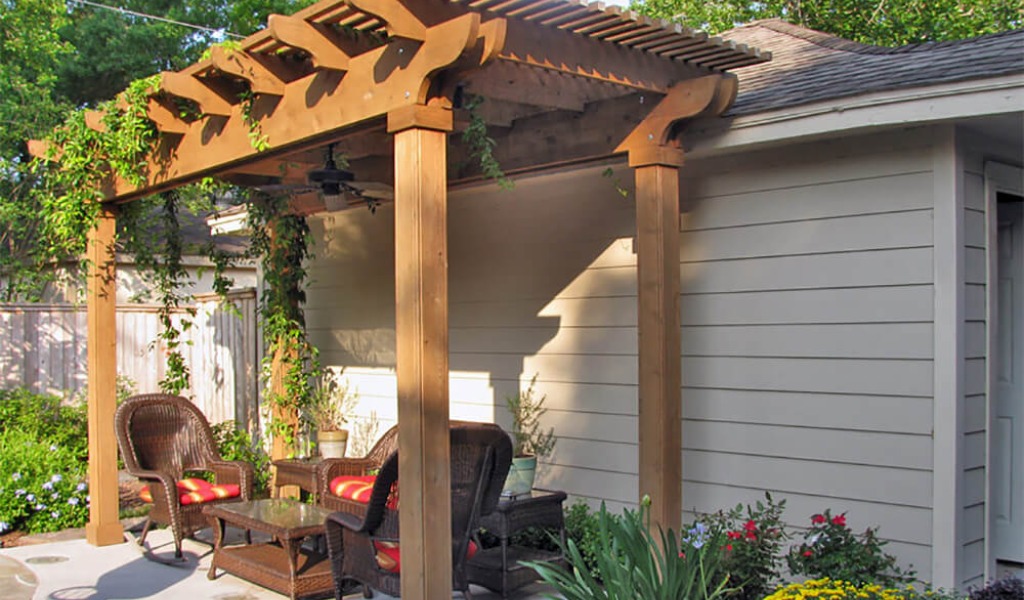When the summer sun starts blazing, outdoor spaces can become unbearable without proper shade. But relief can be found — if those spaces are designed with heat protection in mind. By incorporating trees, pergolas and shade-loving plants, a cool and inviting retreat can be created right in your backyard. The right choices can allow outdoor areas to be enjoyed, even in the height of summer. In this blog, we dig into tips to help you design a shady outdoor space that offers beauty, comfort and relief from the sweltering Houston heat.
Natural Shade
First and foremost, consider adding shade trees to your landscape. A tree canopy can offer some of the most effective and long-lasting protection against direct sunlight, providing a shady retreat for your outdoor space. Native species, such as live oaks, cedar elms and Mexican sycamores, are well adapted to Houston’s unique climate, meaning they are more likely to thrive with less maintenance.
When choosing locations for trees, both the angle of the sun and the layout of your home and yard should be taken into account. Shade should be cast over patios, windows and any frequently used outdoor seating areas. By doing so, both indoor and outdoor temperatures can be reduced. Fast-growing trees may also be used to provide quicker coverage, but their long-term growth should be considered so that crowding, root problems or structural issues are avoided. Professional advice may be sought if tree placement is uncertain.
Custom Wooden Structures
For areas where natural shade isn’t available or where you’d like to add a custom element, wood structures such as pergolas, arbors and gazebos provide a visually appealing solution. A pergola, in particular, can serve as a stylish yet functional addition. Though it doesn’t block all sunlight on its own, it can be enhanced with climbing vines or fabric coverings. For more consistent protection, retractable canopies or shade sails can be integrated into the pergola design. These materials should be chosen in light, UV-resistant colors to help reflect sunlight and reduce heat absorption. Pergolas can be placed over decks, patios or seating areas where natural shade is limited.
Shade-Loving Plants
Not all plants thrive in direct sunlight, especially in Houston’s high temperatures. For this reason, shade-tolerant plants are an ideal option when designing a shady retreat. Plants such as ferns, hostas and others that thrive in low lighting add layers of texture and vibrant color to your landscape. In addition, many climbing plants such as passionflowers, jasmine and crossover vines can be trained to grow up pergolas and along trellises. These plants will provide natural cover and encourage pollinators, which can enhance the overall garden experience. Mulch should be used generously in shaded beds to help retain moisture and prevent overheating of the soil. A drip irrigation system can be installed to keep plants hydrated without wasting water.
Proactive Maintenance
Shady spaces can’t be enjoyed if they’re overgrown or cluttered. That’s why a plan for ongoing maintenance should be part of the initial design. Professional maintenance crews can prune trees regularly to maintain structure and allow filtered light, while also trimming back climbing vines and other fast-growing plants to ensure wood structures are tidy and well-kempt. Mulch should be replenished seasonally, and irrigation systems should be checked for efficiency, especially during drought-prone months. By keeping plants healthy and systems functioning, the cooling benefits of your shady retreat will be preserved year after year.
In Conclusion
Houston’s intense summers don’t have to force you indoors. With thoughtful planning and a focus on trees, pergolas, and shade-loving plants, an outdoor haven can be created — one that’s beautiful, functional and designed for comfort. Even in the hottest months, these cool spaces can provide the perfect place to relax, entertain and connect with nature. If you’re ready to transform your landscape into a relaxing shady retreat, reach out to the team at Prewett, Read & Associates.


